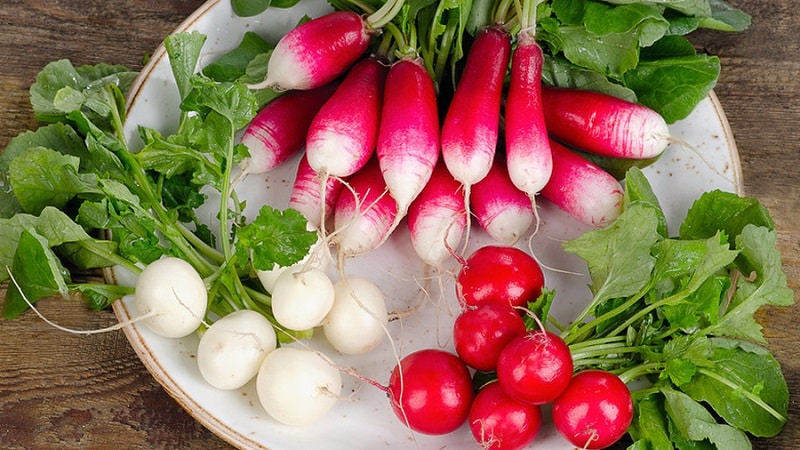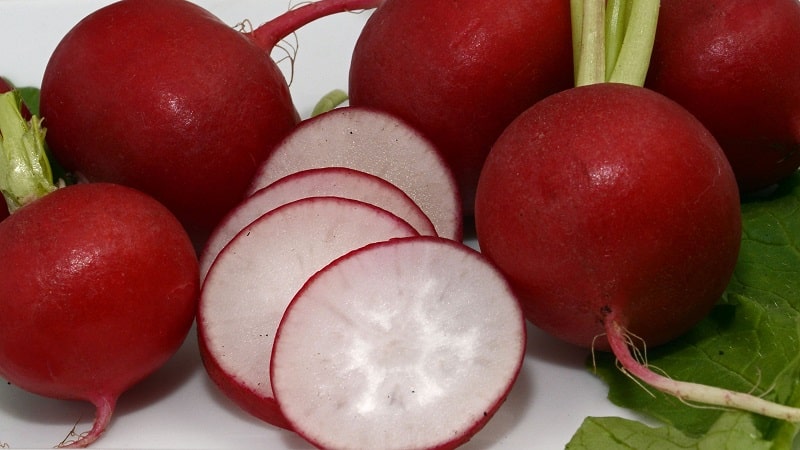What vitamins are in radishes and why are they good for health?
Radishes are a popular vegetable crop in our latitudes. Root vegetables and sometimes leaves are eaten. Radishes are valued as an early vegetable, which in warm regions is sown in the ground in April and the first harvest is obtained then. During the season it is recommended to use it regularly. Scientists claim that frequent consumption of radishes improves skin condition and overall well-being, restores immunity after winter, and saturates the body with vitamins, macro- and microelements.
Let's discuss the benefits and harms of vegetables for the body, composition and nutritional value, medicinal properties and contraindications, and find out how to choose the right radish.
What vitamins are contained in radishes?
Radishes are a source of many vitamins, the presence of which provides full functioning of organs, organ systems and the entire body.

Root vegetables contain the following vitamins::
- Beta carotene - a powerful antioxidant. Takes part in the formation of new cells, slows down the aging process, and prevents the development of malignant tumors.
- Vitamin B1 (thiamine). Necessary for growth and development, proper functioning of the heart, proper functioning of the digestive and nervous systems.
- Vitamin B2 (riboflavin). Creates new blood cells, ensures normal levels of iron in the blood, restores body tissue, protects the skin from microbes, and ensures visual acuity.
- Vitamin B3 (a nicotinic acid).Improves the activity of blood vessels, normalizes tissue metabolism and microcirculation, reduces swelling, and has detoxification properties.
- Vitamin B4 (choline). Reduces cholesterol levels in the blood, protects cell membranes from destruction and damage, and has a calming effect on the nervous system.
- Vitamin B5 (pantothenic acid). Participates in the process of energy production by the cell, is necessary for the metabolism of fats, carbohydrates, fatty acids, hemoglobin, stimulates the production of adrenal hormones, prolongs life.
- Vitamin B6 (pyridoxine) - responsible for the metabolism of proteins and fats, the absorption of unsaturated fatty acids. Takes part in hematopoiesis, improves the functioning of the liver and nervous system, eliminates cramps and muscle spasms, and acts as a diuretic.
- Vitamin B9 (folic acid). It has a positive effect on brain activity, female reproductive function, supports the health of the immune and circulatory systems, and improves the condition of skin and hair.
- Vitamin C (ascorbic acid). It has a general strengthening effect on the walls of blood vessels and small capillaries, creates a barrier against infectious pathogens, and strengthens local immunity.
- Vitamin E (tocopheryl acetate). Maintains normal activity of the gonads, protects against the formation of free radicals, improves blood circulation, lowers glucose levels, participates in the formation of collagen, and helps lose weight.
- Vitamin PP. Regulates the activity of the central nervous system, has a positive effect on the functioning of the gastrointestinal tract, helps prevent the formation of blood clots, and stabilizes blood pressure.
- Vitamin K (phylloquinone).Normalizes the process of blood clotting, has an antimicrobial effect, maintains normal bone density, takes part in the functioning of the kidneys, gall bladder, and liver.

What else is contained
In addition to vitamins, radish contains other components necessary for the body. Among them. Among them:
- water (93%);
- ash;
- alimentary fiber;
- digestible carbohydrates: dextrins, starch, mono- and disaccharides;
- essential amino acids: arginine, lysine, tryptophan, methionine, valine, phenylalanine;
- nonessential amino acids: glycine, aspartic acid, alanine, serine, proline;
- polyunsaturated fatty acids: omega-3 and omega-6 fatty acids;
- trace elements: iodine, boron, aluminum, vanadium, iron, lithium, cobalt, copper, manganese, zinc, selenium, chromium, fluorine, nickel, molybdenum;
- macroelements: chlorine, sulfur, phosphorus, calcium, potassium, magnesium, sodium, silicon.
It will be interesting:
The nutritional value
Radishes are a low-calorie product. 100 g of root vegetable contains 20 kcal, 1.2 g of proteins, 0.1 g of fat, 3.4 g of carbohydrates.

The benefits and harms of radishes
With frequent use radishes have a beneficial effect on various organs and systems:
- Normalizes weight. Root vegetables contain practically no fat, but are rich in carbohydrates, vitamins, micro- and macronutrients, which the body needs so much for saturation. In addition, the components of the composition accelerate the breakdown of fats, improve metabolic processes and digestion, due to which weight loss occurs.
- Prevents the development of cardiovascular diseases. Normalizes blood circulation, improves the condition of the walls of blood vessels, increasing their elasticity, supports the normal functioning of the myocardium, reduces cholesterol and blood sugar levels.
- Protects against depression, calms the nervous system, normalizes night sleep, increases endurance and performance.
- Strengthens the immune system. The composition contains vitamins, proteins, carbohydrates, micro- and macroelements, phytoncides (natural antibiotics), which protect the body from the effects of harmful substances and microorganisms that destroy its cells and tissues and change functional activity. The risk of developing acute respiratory diseases and other infections is reduced.
- Improves digestion. Stimulates the secretion of gastric juice, cleanses the liver system, kidneys, activates metabolism, improves the transport of nutrients into the cell, and normalizes stool.
- Slows down the aging process, participates in the formation of new cells.
- Improves skin condition, hair, nails.
- Prevents the development of cancerous tumors.
Read also:
What to do if there are white midges on tomatoes and how to deal with them
Despite all its usefulness, if consumed incorrectly, the vegetable can cause harm to the body.. In people with individual intolerance to one or more components of the composition, an allergic reaction occurs in the form of peeling, rashes, redness on the skin, itching, lacrimation, and Quincke's edema.
For diseases of the gastrointestinal tract Fresh radishes can cause an exacerbation of pathology, worsen its course and general health.
Healing properties for various organs and systems of the body
Radishes are popular among supporters of traditional medicine. Vegetables grown without pesticides are used to treat and prevent a wide range of diseases.:
- Diabetes — lowers blood glucose levels, normalizes all types of metabolism, prevents the development of complications.
- Atherosclerosis, coronary heart disease, hypertension - stabilizes blood pressure, dilates blood vessels and increases the flow of oxygen to the tissues of the heart muscle, improves microcirculation, affects the viscosity and fluidity of blood.
- Constipation - facilitates bowel movements, restores normal density of stool.
- Urolithiasis disease — removes stones from various parts of the urinary system, most often from the liver, kidneys, bladder, relieves pain and spasms.
- ARVI, acute respiratory infections, infections — kills or suppresses the growth and development of pathogenic microorganisms, prevents their spread throughout the body, shortens recovery time, and takes part in the formation of antimicrobial immunity.
- Problematic, unhealthy skin - tones, refreshes, moisturizes, saturates the skin with beneficial vitamins, micro- and macroelements, participates in the production of collagen fibers, which makes the dermis more elastic and smoothes out fine wrinkles.
- Skeletal pathologies, osteoporosis - retains calcium in bones and the body, increases bone mineral density, improves the condition of the skeletal system, reduces the breakdown of bone collagen, and reduces the incidence of fractures.
- Eye diseases - improves night vision, stabilizes intraocular pressure, strengthens the retina, prevents the development of cataracts.
Radishes are used as an antiallergic, decongestant, and diuretic., in the presence of chronic inflammatory processes in the body to prevent exacerbations. Frequent consumption of vegetables helps solve the problem of psycho-emotional stress, improve night sleep, lift your mood, increase physical endurance, and increase mental activity.
For reference. There are many varieties of radish, differing in shape (from flat-round to spindle-shaped), color (yellow, white, pink, red, purple), and origin (Chinese, Japanese, European). Moreover, all varieties have practically the same taste.
Consumption norms per day
Radishes are consumed in their pure form or processed into juice.. The daily dose and frequency of use of the vegetable depends on the goals of therapy, the age of the person, and the presence of concomitant diseases. The average portion for an adult is 250-300 g per day (about 10 medium-sized root vegetables). People diagnosed with gastritis, gastric ulcer, and duodenal ulcer are recommended to consume 3-4 medium-sized root vegetables once a week.

You can drink 200-250 ml of juice every other day., but only in the absence of diseases of the digestive system. The drink goes well with other vegetable juices, which change its taste and add new medicinal effects.
Important! The vegetable should not be consumed on an empty stomach or before bedtime, as it is heavy food for the stomach. Nutritionists advise using radishes as an independent snack or adding them to a vegetable salad.
Contraindications
Radishes are contraindicated in case of individual intolerance. It is recommended to limit its use to people suffering from gastrointestinal diseases: gastritis with high acidity, stomach and duodenal ulcers, especially during exacerbations. The vegetable can increase pain, provoke a new spasm, a feeling of pain in the stomach, and heartburn.
Tips for choosing radishes
The best radishes are these greenhouse or bed varieties, grown independently without pesticides. You can buy a good vegetable, but you need to know how to choose the right radish.
You can buy root vegetables from mid-April to late autumn. In winter, it is better to avoid eating vegetables: there is a high probability that it was grown using chemicals or is saturated with genetically modified organisms.

What to look for when buying radishes:
- fresh radishes have green, fresh, juicy tops;
- the skin is smooth, even, without cracks or signs of damage by pests;
- The fruits are dense and elastic to the touch.
For reference. Black dots on the peel indicate that the process of rotting has begun. This product should not be eaten.
Small fruits are more beneficial and safe for the body, just like round varieties. Large, elongated roots often contain nitrates. The exception will be varieties grown independently without chemicals.
For reference. Root vegetables have a pungent taste due to the mustard oil they contain, but are not bitter. Bitterness is characteristic of vegetables that have not been watered enough.
Store radishes in the refrigerator, after removing the tops, for no longer than 14 days.. The tops are also used for food as an ingredient for salads, okroshka, and soups.
Conclusion
Radishes compare favorably with other vegetable crops due to their varied chemical composition.It satisfies the body's needs for vitamin C, silicon, cobalt, copper, chromium, and other vitamins, micro- and macroelements necessary to maintain normal functioning of the body. The usefulness of radishes can hardly be overestimated: when consumed frequently, it has a beneficial effect on the cardiovascular and digestive systems, calms the nervous system, promotes weight loss, strengthens the immune system, and improves skin condition.
Like all products, radishes have contraindications (individual intolerance and gastrointestinal diseases), which must be taken into account before starting use.